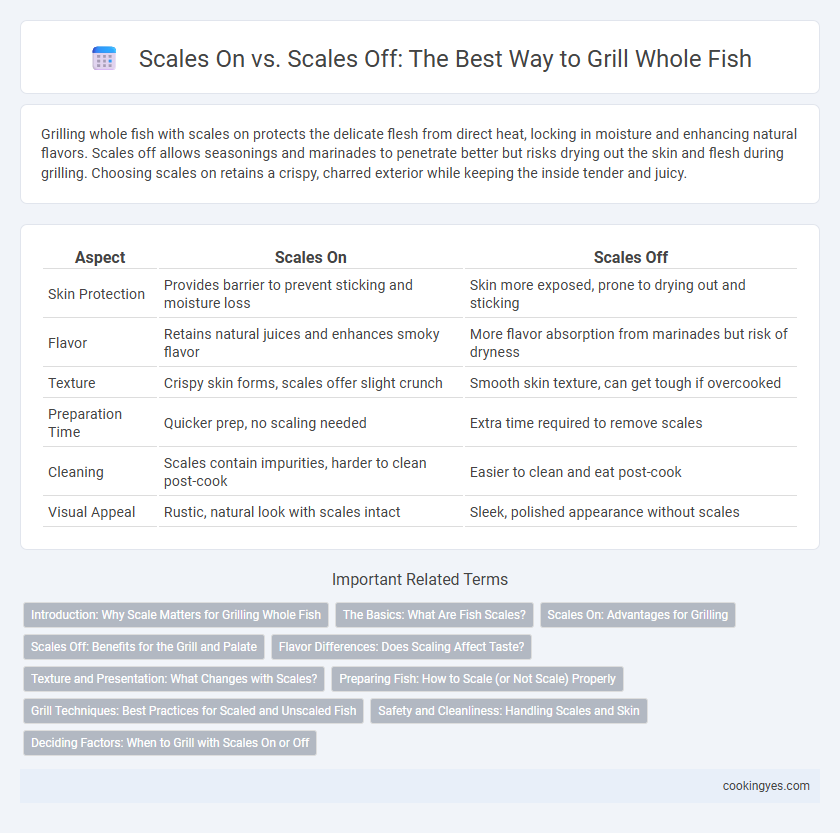Grilling whole fish with scales on protects the delicate flesh from direct heat, locking in moisture and enhancing natural flavors. Scales off allows seasonings and marinades to penetrate better but risks drying out the skin and flesh during grilling. Choosing scales on retains a crispy, charred exterior while keeping the inside tender and juicy.
Table of Comparison
| Aspect | Scales On | Scales Off |
|---|---|---|
| Skin Protection | Provides barrier to prevent sticking and moisture loss | Skin more exposed, prone to drying out and sticking |
| Flavor | Retains natural juices and enhances smoky flavor | More flavor absorption from marinades but risk of dryness |
| Texture | Crispy skin forms, scales offer slight crunch | Smooth skin texture, can get tough if overcooked |
| Preparation Time | Quicker prep, no scaling needed | Extra time required to remove scales |
| Cleaning | Scales contain impurities, harder to clean post-cook | Easier to clean and eat post-cook |
| Visual Appeal | Rustic, natural look with scales intact | Sleek, polished appearance without scales |
Introduction: Why Scale Matters for Grilling Whole Fish
Keeping scales on a whole fish while grilling preserves moisture and enhances flavor by creating a natural barrier that protects the delicate flesh from direct heat. Scales also help maintain the fish's structure, preventing it from sticking to the grill and falling apart. Removing scales exposes the skin, which can lead to dryness and uneven cooking, diminishing the overall quality of the grilled fish.
The Basics: What Are Fish Scales?
Fish scales are small, rigid plates that cover the skin of most fish, serving as a protective barrier against parasites, physical damage, and infections. These scales vary in type, such as cycloid, ctenoid, and placoid, each differing in texture and structure based on the fish species. Understanding the role and characteristics of fish scales is essential when deciding whether to grill whole fish with the scales on or off.
Scales On: Advantages for Grilling
Grilling whole fish with scales on preserves moisture by acting as a natural barrier, preventing the flesh from drying out and enhancing tenderness. The scales also protect the skin from burning, ensuring even cooking and a crispy texture without sticking to the grill. This method retains flavor and nutrients, delivering a juicier, more flavorful grilled fish experience.
Scales Off: Benefits for the Grill and Palate
Grilling whole fish with scales off enhances heat penetration, resulting in more even cooking and a crispier skin texture. Removing scales prevents flare-ups caused by trapped oils, protecting the grill from excessive smoke and residue buildup. The absence of scales allows marinades and seasoning to deeply infuse the flesh, improving flavor and creating a tender, succulent palate experience.
Flavor Differences: Does Scaling Affect Taste?
Grilling whole fish with scales on preserves natural oils and moisture, resulting in a juicier, more flavorful taste as the scales act as a barrier against direct heat. Removing scales exposes the delicate flesh, allowing seasonings to penetrate more deeply but often leading to drier texture and less intense fish flavor. The choice between scales on or off influences flavor intensity, texture, and moisture retention during grilling.
Texture and Presentation: What Changes with Scales?
Grilling whole fish with scales on creates a crispy, protective crust that locks in moisture, resulting in a tender, flaky interior, while also enhancing presentation with a rustic, golden-brown appearance. Removing scales before grilling exposes the skin directly to heat, which can cause uneven cooking and a less appealing texture. The choice between scales on or off significantly influences both the texture of the flesh and the visual appeal of the final dish.
Preparing Fish: How to Scale (or Not Scale) Properly
Properly preparing whole fish for grilling begins with deciding whether to scale it; keeping scales on can protect delicate flesh from direct heat and retain moisture. When scaling, use a fish scaler or the back of a knife, scraping against the grain from tail to head to remove scales evenly without damaging the skin. Rinsing the fish thoroughly under cold water removes any remaining loose scales, ensuring a clean surface for seasoning and grilling.
Grill Techniques: Best Practices for Scaled and Unscaled Fish
Grilling fish with scales on helps retain moisture and protects the delicate flesh from direct heat, resulting in a juicier, more flavorful dish. For scaled fish, use moderate heat and oil the grill grates to prevent sticking, flipping carefully to keep the scales intact; when grilling fish with scales off, apply a thin layer of oil or marinade to enhance flavor and prevent drying out. Both techniques benefit from scoring the skin to ensure even cooking and to allow marinades or seasonings to penetrate deeply.
Safety and Cleanliness: Handling Scales and Skin
Grilling whole fish with scales on provides a natural barrier that prevents direct contact between the heat and the delicate flesh, reducing the risk of sticking and preserving moisture. Handling fish with scales requires careful cleaning to remove slime and debris, ensuring safety and hygiene during preparation. Removing scales before grilling facilitates seasoning and marinating but necessitates thorough washing to eliminate any loose scales, promoting cleanliness and avoiding contamination.
Deciding Factors: When to Grill with Scales On or Off
Grilling whole fish with scales on preserves moisture and protects delicate flesh from direct heat, ideal for species with thick, sturdy scales like salmon or sea bass. Removing scales enhances seasoning penetration and creates a crispier skin, preferable for thinner-scaled fish such as trout or snapper. Consider fish type, cooking method, and personal texture preference when deciding to grill with scales on or off.
Scales On vs Scales Off for Grilling Whole Fish Infographic

 cookingyes.com
cookingyes.com